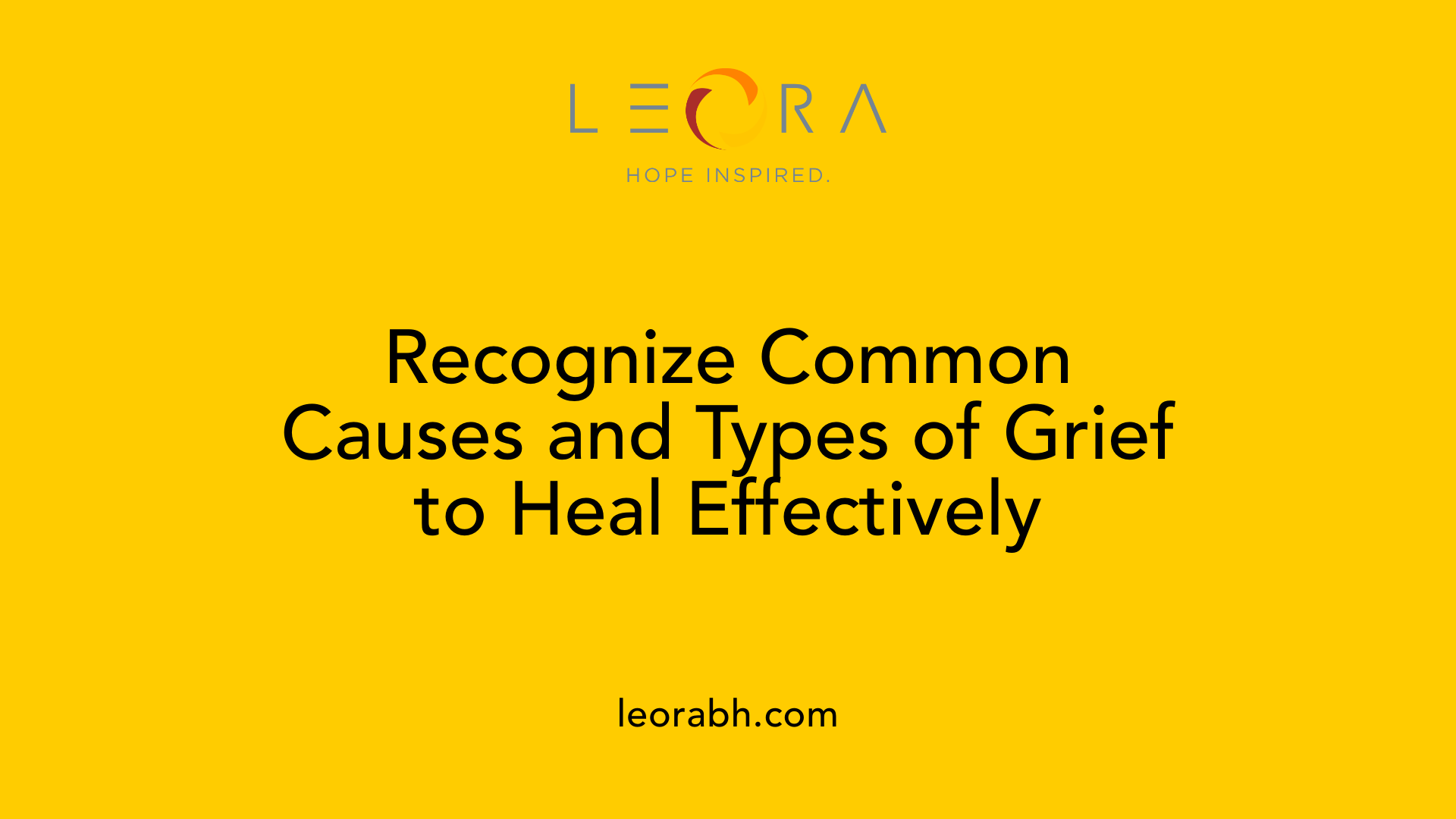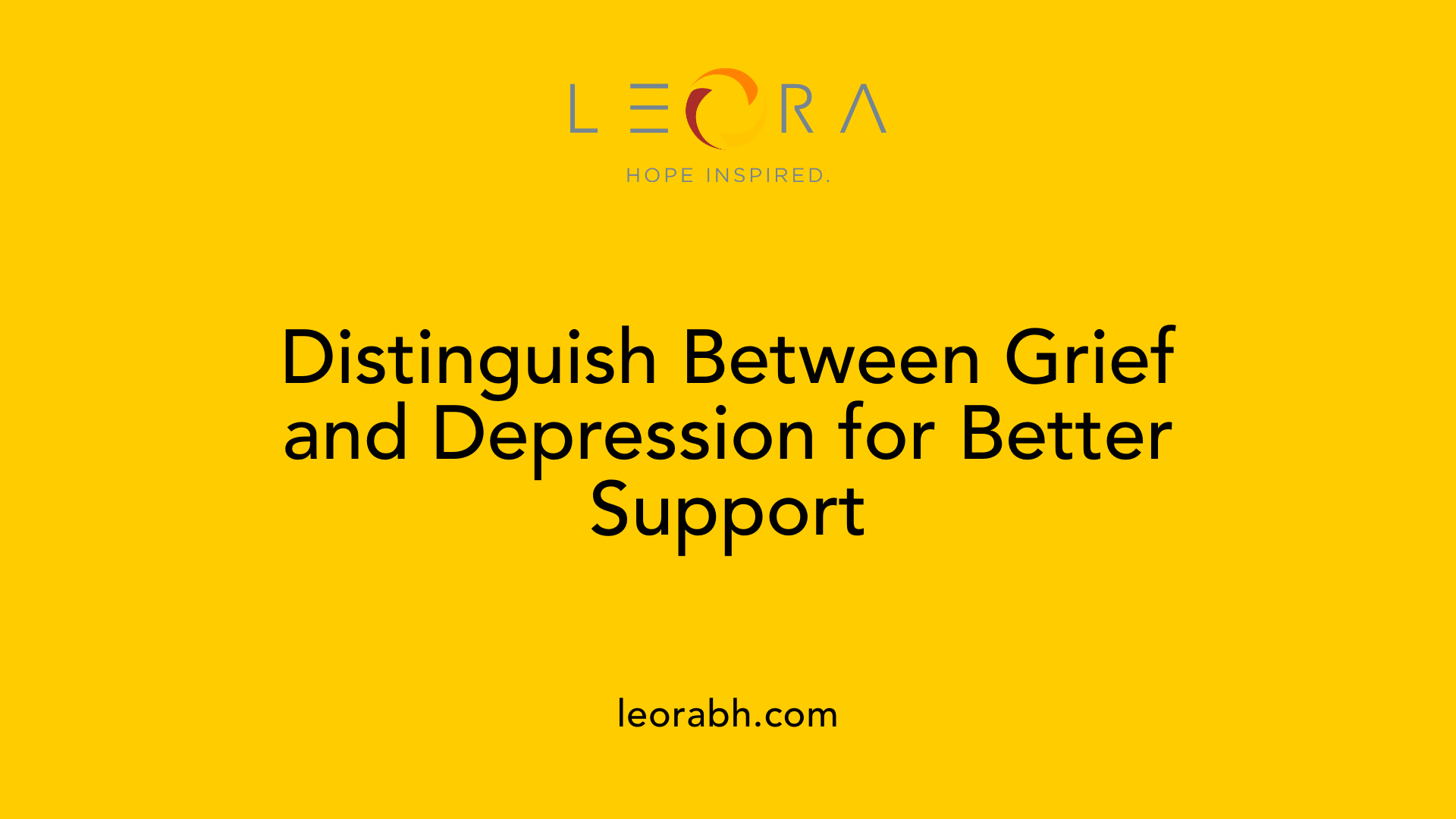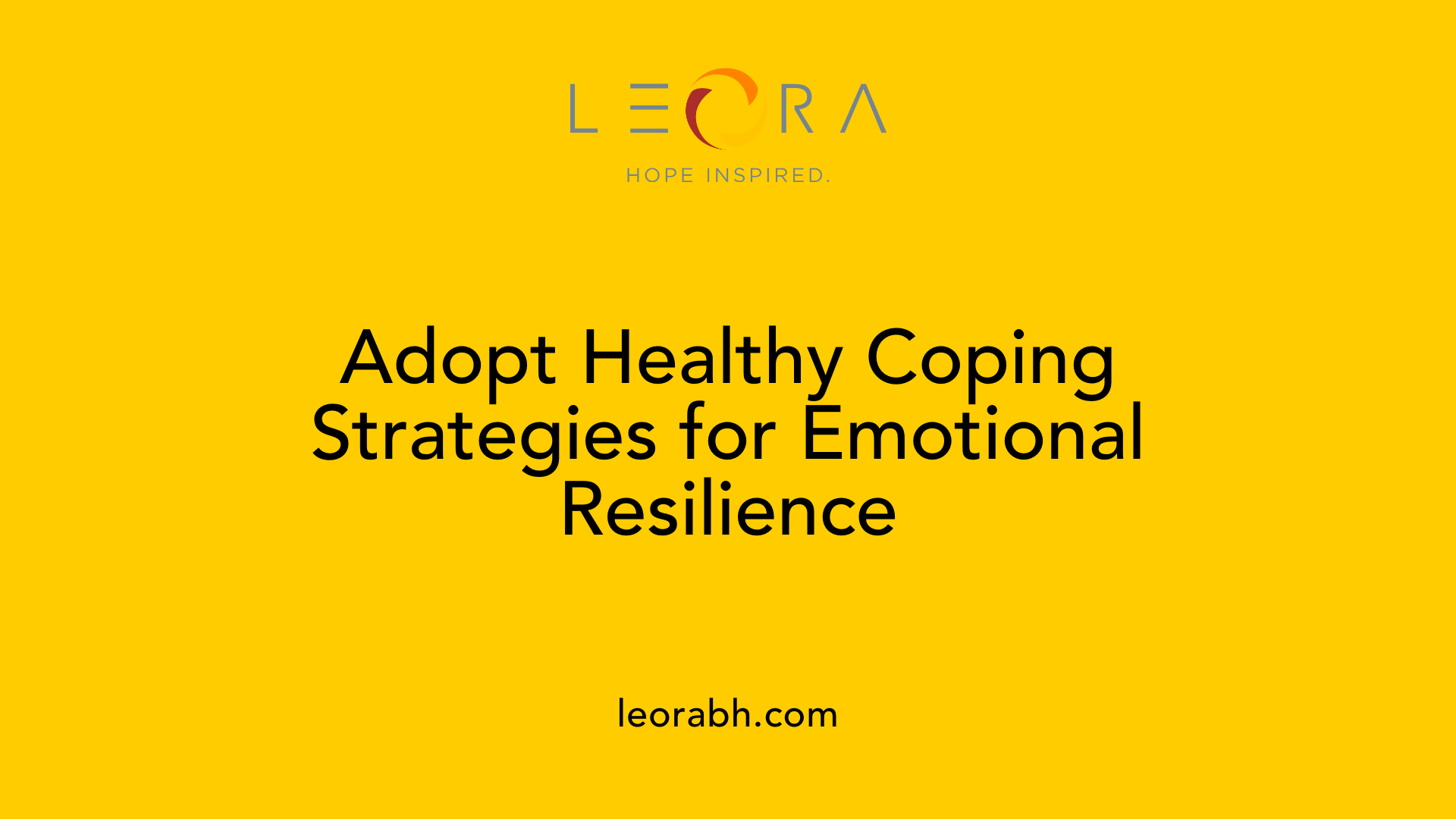How to Navigate Grief and Loss During Recovery
Healing Through Heartache: Understanding and Embracing Loss in Recovery
Navigating the Emotional Storm of Grief During Recovery
Recovery from addiction or other health challenges is a complex journey that often involves confronting feelings of grief and loss. Whether it’s the loss of a loved one, relationships, or habits that once defined your identity, grief can significantly impact your emotional stability and recovery progress. Understanding the stages of grief, recognizing symptoms, and employing effective coping strategies are crucial for maintaining resilience and preventing relapse. This article explores how to navigate grief and loss during recovery, emphasizing compassion, awareness, and active support.
Understanding Grief and Its Natural Process

What is grief?
Grief is a natural emotional response to experiencing loss. It encompasses a wide range of feelings such as sadness, anger, guilt, anxiety, and despair. When someone or something we love is taken away—be it a family member, a pet, or even a part of our identity—our reactions can be intense and varied.
Physical and psychological symptoms of grief often include trouble sleeping, digestive issues, aches, headaches, difficulty concentrating, and withdrawal from social activities. These reactions are normal and a part of the healing process.
What are common causes of grief?
People encounter grief due to various life events. Common sources include bereavement (the loss of loved ones), the death of pets, divorce, loss of health, losing a job, or other significant life changes. Sometimes, grief can also arise from the loss of a role, relationship, or sense of control.
In the context of recovery from addiction or mental health challenges, grief may stem from the loss of relationships, personal freedom, or previous lifestyles. It can even be triggered by the loss of the addiction itself or the procedures associated with change.
Types of grief
There are several forms of grief that individuals may experience:
| Type of Grief | Description | Examples |
|---|---|---|
| Anticipatory Grief | Occurs before an expected loss, allowing some mourning in advance. | Caring for a terminally ill loved one |
| Common Grief | Happens after expected or unexpected loss, experienced by most. | Funeral of a loved one, divorce |
| Unresolved or Complex Grief | Prolonged grief that may involve difficulty moving on and can lead to depression or substance use disorder. | Long-term mourning after a tragic event |
This ongoing process varies widely among individuals. Not everyone experiences all stages of grief, nor do they necessarily occur in order.
How to cope effectively with grief and loss during recovery?
Managing grief in recovery requires patience and self-awareness. It is crucial to acknowledge feelings openly and avoid suppressing emotions. Talking with trusted friends, family, or support groups—especially those familiar with similar experiences—can provide reassurance and understanding.
Seeking help from mental health professionals—such as therapists or counselors—can offer structured strategies to process complex emotions and avoid unhealthy coping mechanisms like substance abuse. Participating in community support programs like GriefShare, which provides 13-week sessions with educational videos and shared experiences, can normalize feelings and promote healing.
Developing routines that incorporate self-care—such as physical activity, healthy eating, sufficient sleep, and engaging hobbies—can help rebuild resilience. Planning for potential emotional triggers, like anniversaries or holidays, and leaning on support systems ensures safe navigation through tough times.
Overall, allowing oneself time to grieve and expressing pain openly are essential steps toward emotional recovery. Recognizing that grief is a personal journey, and seeking professional or community support when needed, greatly enhances the healing process.
Identifying and Recognizing the Symptoms and Stages of Grief

What are the key stages and symptoms of grief to look out for during recovery?
Understanding grief involves recognizing its progression through various emotional and physical signs. The five stages of grief, as identified by psychiatrist Elisabeth Kübler-Ross, are denial, anger, bargaining, depression, and acceptance. It is important to note that not everyone experiences all these stages or in a linear fashion; some may revisit certain stages multiple times.
In terms of symptoms, grief manifests in multiple ways. Emotionally, individuals often experience intense fluctuations such as profound sadness, irritability, guilt, frustration, or even anger. Anxiety and feelings of despair may also be prominent, with some experiencing moments of numbness or disbelief about the loss.
Physically, grief can have tangible effects. Common signs include sleep disturbances—either insomnia or excessive sleeping—and changes in appetite, leading to weight fluctuations. Somatic sensations like stomach pain, headaches, muscle aches, fatigue, or digestive issues may occur. Some persons also report difficulty concentrating, memory problems, or feeling disconnected from reality.
Behavioral reactions often involve social withdrawal, crying spells, and difficulty engaging in daily activities. Cognitive challenges, such as preoccupation with the deceased or the circumstances surrounding the loss, can further hinder functioning.
Recognizing these symptoms and stages is essential for understanding your own experience or supporting others. Grief may sometimes become complicated if symptoms persist or worsen, which could require professional intervention. Coping strategies like seeking support, engaging in self-care routines, and allowing time to grieve can promote healing and prevent the development of prolonged grief disorder.
Differentiating Between Grief and Other Emotional Challenges

How can I differentiate grief from depression or other emotional challenges during recovery?
Understanding the differences between grief and depression is essential, especially during recovery from addiction. While both can cause intense emotional pain, they have distinct patterns and characteristics.
Grief is usually a response to a specific loss, such as the death of a loved one, a breakup, or losing a job. It often comes in waves, with feelings of sadness, longing, anger, or even moments of happiness and acceptance. These emotions fluctuate and may be connected to certain triggers like anniversaries or memories.
In contrast, depression tends to be more persistent and pervasive. It is characterized by a consistent low mood, feelings of worthlessness, hopelessness, and a lack of interest in activities that once brought joy. Physical symptoms such as fatigue, changes in sleep, appetite, and concentration are common, and these symptoms tend to last for weeks or longer without fluctuation.
Signs of depression vs grief
| Aspect | Grief | Depression | Additional Details |
|---|---|---|---|
| Cause | Specific loss | No specific cause, or ongoing struggles | Grief arises after a particular loss; depression may lack a clear trigger |
| Duration | Fluctuates, may lessen over time | Persistent, lasting weeks or months | Grief tends to improve gradually with support; depression remains steady |
| Emotions | Sadness, yearning, anger, relief | Sadness, hopelessness, worthlessness | Grief involves emotional waves; depression involves continuous low mood |
| Physical symptoms | Fatigue, sleep changes, aches | Energy loss, sleep disturbances, appetite changes | Both may affect physical health, but depression's physical symptoms are more constant |
| Impact on functioning | May temporarily impair, may improve | Usually impairs daily functioning consistently | In grief, functioning may improve over time; in depression, impairments are often ongoing |
Why is proper diagnosis important?
Accurately distinguishing between grief and depression ensures individuals receive the right treatment. While grief might benefit from support groups, counseling, and patience, depression may require specific therapies, medication, or a combination thereof.
Misdiagnosing depression as grief can delay crucial treatment, prolong suffering, and increase risk factors such as suicidal thoughts and relapse. Conversely, misinterpreting grief as depression could lead to unnecessary medication or treatment, possibly hindering the natural healing process.
If feelings of sadness or emptiness persist beyond a year, or if they severely interfere with daily life, consulting a mental health professional is essential. Correct diagnosis allows for tailored support, paving the way for recovery and emotional well-being.
Effective Strategies for Managing Grief and Loss

What are effective coping strategies for managing grief and loss during recovery?
Managing grief during recovery requires adopting healthy and constructive coping mechanisms. One of the most helpful approaches is to openly acknowledge and process your feelings. This can be done through journaling, which allows a safe outlet for emotions, or by talking with supportive friends and family members who can provide comfort and understanding.
Seeking support from mental health professionals is also crucial, especially if grief becomes overwhelming or complicated. Therapies such as cognitive-behavioral therapy (CBT) and other modalities like EMDR or acceptance and commitment therapy (ACT) can aid individuals in navigating intense emotions and breaking free from patterns of avoidance.
Engagement in activities that foster emotional well-being can facilitate healing. Creative pursuits such as art, music, or writing serve as expressive outlets, while physical activities like walking, yoga, or sports help reduce stress and improve mood. Spiritual practices or mindfulness meditation can also provide solace during difficult times.
A helpful guideline for effectively managing grief involves the Three Cs: Choose, Connect, and Communicate. Choosing healthy activities over harmful ones, connecting with community or support groups, and communicating emotions honestly can lessen feelings of loneliness and despair.
Understanding that grief may sometimes become prolonged or complex, especially in cases of unresolved or traumatic loss, underscores the importance of professional help. Support providers can assist in addressing underlying issues and preventing complications such as depression or substance misuse.
Finally, accepting the uncertainty inherent in grief—such as ambiguous feelings or unpredictable emotional waves—helps build resilience. Recognizing that healing is a gradual process allows individuals to be patient with themselves, fostering long-term recovery and emotional strength.
Impact of Grief on Recovery Trajectory and How to Prevent Setbacks
How does grief affect recovery progress, and how can I prevent emotional setbacks?
Grief has a profound influence on recovery, especially for individuals overcoming addiction or managing mental health issues. When experiencing grief, emotional distress, physical symptoms like sleep disturbances, and physiological changes such as elevated stress hormones can occur. These alterations can weaken the immune system, increase blood pressure, and impair overall health, making it harder for someone to stay on track with their recovery goals.
Prolonged or intense grief, particularly when it escalates into complicated grief or persistent grief disorder, can disrupt daily routines and hinder emotional stability. It can lead to feelings of numbness, depression, or even physical health problems, all of which pose risks like cardiovascular issues or multiple stress-related conditions.
To prevent emotional setbacks, proactive strategies are essential. Recognizing and allowing oneself to process grief gradually helps prevent bottling up emotions, which can lead to more severe mental health challenges. Seeking social support from friends, family, or support groups provides comfort and validation. Engaging in professional mental health interventions, such as therapy, can offer tailored coping tools and facilitate emotional processing.
Incorporating mindfulness practices, maintaining healthy lifestyle habits, and engaging in activities that promote emotional expression—like journaling, art, or physical activity—are beneficial. It’s also important to identify risk factors early, such as traumatic losses or social isolation, which might elevate the chance of developing prolonged grief.
Continual self-care, open communication, and staying connected with support networks foster resilience. Regular therapy sessions can help navigate the complexities of grief, reducing the likelihood of relapse or depression, and helping individuals rebuild stability amidst emotional turmoil. Ultimately, understanding that grief is a natural, albeit challenging, part of life allows recovery processes to incorporate healing and growth, setting a foundation for long-term resilience.
Types of Loss Encountered in Recovery and Their Emotional Toll
What types of loss are commonly experienced during recovery, and how do they affect emotional well-being?
During recovery from substance use or major life changes, individuals often face various significant losses. These may include the death of loved ones, the ending of relationships, losing a job, health deterioration, or the loss of personal routines and identities connected to substance use.
Such losses evoke a spectrum of emotional reactions. Feelings like deep sadness, anger, guilt, disbelief, and numbness are common, often disrupting daily routines and mental health. It is normal to experience physical symptoms such as fatigue, sleep issues, headaches, and appetite changes in response to grief.
Unresolved or prolonged grief can intensify emotional distress, leading to social withdrawal, difficulty concentrating, and even depression. These reactions emphasize the importance of recognizing and addressing emotional responses" to promote healing and emotional stability.
| Type of Loss | Typical Emotional Response | Impact on Well-being | Additional Notes |
|---|---|---|---|
| Death of loved ones | Sadness, disbelief, anger, guilt | Emotional distress, physical symptoms, risk of depression | May trigger long-term grief if unresolved |
| Breakup or divorce | Loss of attachment, loneliness | Anxiety, depression, identity confusion | Can impact self-esteem and future relationships |
| Loss of health or job | Fear, frustration, shame | Increased stress, decreased self-worth | May lead to financial or health-related hardships |
| Significant life change | Shock, denial, adaptation struggles | Disruption of routines, emotional exhaustion | Support systems are vital during transitions |
Understanding these common losses and their emotional impacts aids in seeking support and practicing self-care. Resources like therapy, support groups, and personal coping strategies are essential in recovering emotionally and maintaining overall well-being during challenging times.
A Guide to Supporting Yourself and Others Through Grief
What should I avoid doing while grieving to support my recovery?
During the grieving process, it’s crucial to be mindful of actions that can hinder healing. One common mistake is attempting to numb feelings by using alcohol or drugs. While these substances might temporarily dull pain, they often lead to worsened depression, anxiety, sleep disturbances, and can impair judgment.
Instead of suppressing emotions, permit yourself to feel and express your pain. Processing grief involves facing feelings honestly, which facilitates emotional release and recovery.
It’s also important to avoid making impulsive or major life decisions during this emotionally unstable phase. When overwhelmed, judgment can be clouded, potentially leading to choices that might complicate healing.
Focusing excessively on regrets or mistakes is another pitfall. While reflecting can promote growth, dwelling on what cannot be changed can deepen feelings of guilt and hopelessness.
Lastly, try not to isolate yourself completely. Social connections act as vital support systems. Reaching out to trusted friends, family, or mental health professionals can provide comfort and guidance during difficult times.
Maintaining balance by avoiding these counterproductive behaviors and fostering healthy coping strategies can significantly aid your path through grief.
Embracing the Journey of Healing
Navigating grief and loss during recovery demands patience, self-awareness, and a supportive environment. Recognizing the emotional stages and symptoms characteristic of grief allows for tailored coping strategies, from expressive outlets to professional therapy. Differentiating grief from depression ensures appropriate treatment, while active engagement in self-care and community support can mitigate setbacks. The journey through loss is deeply personal, but with compassion and resilience, individuals can emerge stronger, carrying memories of their loved ones while moving forward toward a healthier, more hopeful future.
References
- Coping with Grief and Loss: Stages of Grief and How to Heal
- Coping With Grief in Recovery - Miramont Behavioral Health
- How Can You Grieve in Addiction Recovery? - PaRC Discovery
- The Role of Grief and Loss in Addiction Recovery - Oxbow Academy
- Grief & Loss in Recovery
- GriefShare: Need Help Dealing with Grief?
- Coping with Loss While in Recovery - Staying Sober in Grief
- Coping With Grief and Loss | National Institute on Aging
- Grief in Recovery: Coping with Sadness and Loss
Find Your Inner Light
Related Articles
Schedule an Assessment
Leora Behavioral Health provides comprehensive treatment services, including ambulatory detox, mental health IOP, and SUD IOP, to support your journey toward lasting recovery.
Our caring team will guide you through the admissions process and create a personalized treatment plan tailored to your unique needs. We welcome walk-ins. If you or a loved one is struggling, reach out today. We’re here to help.


.svg)




.svg)
.svg)
.svg)
.svg)
